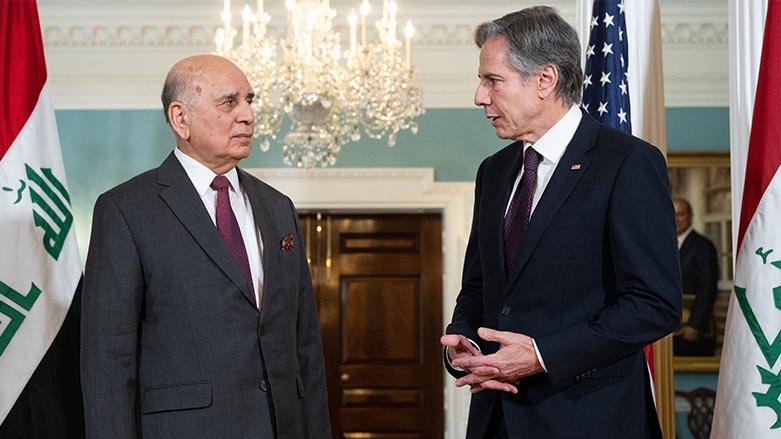US, Iraq hail ties, following Foreign Minister’s visit

WASHINGTON DC, United States (Kurdistan 24) – As the visit of an Iraqi delegation led by Fuad Hussein, Iraqi Deputy Prime Minister and Foreign Minister, drew to a close, the US and Iraq issued a joint statement affirming their shared interest in maintaining and strengthening relations between the two countries.
Hussein’s visit, which began last Thursday, was the first senior Iraqi delegation to the US since the formation of Iraq’s new government last October, after a year-long stalemate following national elections.
A major item on the US-Iraqi agenda involved Iran’s exploitation of Iraq’s banking system to circumvent US sanctions. Indeed, John Hannah, National Security Advisor to Vice President Dick Cheney, and Joel Rayburn, former US special envoy to Syria, described this in scathing terms.
Following the 2003 overthrow of Saddam Hussein’s regime, the US established a process, known as the “dollar auction,” to facilitate Iraq’s access to dollars “at preferred rates to finance badly needed imports,” Hannah and Rayburn explained.
The system, though well-intentioned, was soon badly corrupted and exploited.
“For over a decade, Iraqi politicians have abused their easy access to US dollars to steal from their people on a historical scale,” Hannah and Rayburn wrote. “Even more threatening, successive Iraqi governments have colluded with Iran’s Islamic Revolutionary Guard Corps (IRGC) to circumvent US sanctions and funnel billions to finance Iran’s nuclear program, terrorism, and regional aggression.”
Last fall, the US began to scrutinize the foreign transactions of Iraqi banks much more closely in order to stop that abuse. That had the effect of restricting Iraq’s access to dollars, and it precipitated a sharp decline in the value of Iraq’s currency.
Hussein was in Washington to work out a way of dealing with the issue which would allow the US to counter the abuses in the current system, without imperiling Iraq’s currency.
US-Iraqi Joint Statement
The meetings between the US and Iraq were held under the auspices of the US-Iraq Higher Coordinating Committee (HCC.) They were led by Fuad Hussein on the Iraqi side and Secretary of State Antony Blinken on the US side, and the two parties issued a joint statement late on Wednesday.
“The delegations reaffirmed their determination to deepen the strategic relationship across the full range of bilateral issues,” their statement said.
“This meeting marked the first HCC focused on economic cooperation, energy sector development, and climate change,” it noted, calling this “a sign of a maturing strategic partnership under the SFA”—the Strategic Framework Agreement, concluded in 2008, as George W. Bush prepared to leave office.
The joint statement gives the impression that Washington and Baghdad have reached some understanding on coordinated efforts to tackle key issues, including Tehran’s diversion of US dollars through Iraq’s banking system.
“The United States welcomed the Iraqi government’s efforts to enact economic and monetary policy reforms, modernize the financial and banking system, combat corruption, and prevent manipulation of the financial system,” it stated, while Washington promised to assist Baghdad in those efforts.
Both sides also seek to improve Iraq’s energy use. That includes diminishing its dependence on Iran for natural gas, as well as addressing its chronic electricity shortage, which regularly becomes acute in the hot summer months.
Iraq flares natural gas in the course of its oil production, because it lacks the facilities to capture the gas. It then imports natural gas from Iran to fuel its electricity plants.
In December, Iraq’s new Oil Minister, Hayan Abdel-Ghani, announced that Iraq planned to eliminate gas flaring within four years.
In their joint statement, the US and Iraq “resolved to accelerate efforts to capture flared gas, upgrade natural gas distribution infrastructure and reduce methane leakage.”
They also stressed the importance of connecting Iraq’s electricity grid to Jordan, Saudi Arabia, and the Gulf Cooperation Council Interconnection Authority, one more step in drawing Iraq further from Iran and closer to the Sunni Arab states which are aligned with the US.
Finally, “the United States welcomed positive developments in relations between the Iraqi federal government and the Kurdistan Regional Government and the ongoing negotiations over the 2023 federal budget and the hydrocarbons law,” the joint statement said.
However, nothing in the statement—or any other news from the visit of the Iraqi delegation—addressed a key problem. Iraq’s Supreme Federal Court (SFC) has been suborned by Iran through the President of the Iraqi Supreme Judicial Council, Faiq Zaydan, and former prime minister Nuri al-Maliki.
In early 2022, the head of the IRGC’s Qods Force, Brig. Gen. Esmail Qaani, visited Baghdad and, along with Maliki, met with Zaydan. Since then, the SFC has issued a series of dubious rulings, contrary to the interests of the Kurdistan Region.
A Congressional letter, written last week, asked the Biden administration how it intended to address this problem.
The Congressmen gave the administration until Feb. 24 to answer that question, along with several others, and the response should be quite interesting. So far, there has been no indication, at least publicly, that it has developed a way to deal with this problem at all.
